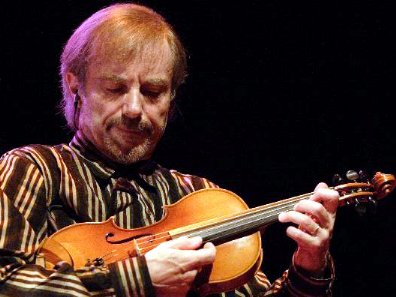| B i o g r a p h y |
 French violinist Jean-Luc Ponty
(1942) is the musician who took the violin into the electric/electronic
age and made it a pivotal force of the jazz-rock movement. Originally
employed in a symphony orchestra, Ponty debuted at the age of 22 with
Jazz Long Playing (1964). His first important composition was Suite For
Claudia on Sunday Walk (1967) for a quartet with pianist Wolfgang
Dauner, bassist Niels Pedersen and drummer Daniel Humair. Ponty had
already developed a style at the instrument that basically imitated the
phrasing of the bebop soloist and occasionally flirted with free jazz.
He more than flirted with jazz-rock when, relocated to Los Angeles, he
started working with rock composer Frank Zappa (1968). Ponty joined
forces with pianist George Duke to form the ensemble of Electric
Connection (1968), that contained his Hypomode Del Sol, and the
ensemble of King Kong (1969), that performed music by Zappa (notably
Music for Electric Violin and Low Budget Orchestra, a masterpiece of
jazz, rock and classical fusion). (Experience and King Kong were later
combined as Canteloupe Island.) Ponty's main compositions of the time
reflected the Zappa influence: Contact on Experience (1969) for a
quartet with Duke on piano, the 20-minute three-movement suite Flipping
and the 15-minute Open Strings on the sublime Open Strings (december
1971) for a quintet with keyboardist Joachim Kuhn and guitarist Philip
Catherine, Astrorama on Astrorama (1970), Concerto for Jazz Violin and
Orchestra on With Kurt Edelhagen & His Orchestra (october 1971),
and especially the five-movement Sonata Erotica (1972), recorded live
with Ponty on acoustic violin and echo box, Joachim Kuhn on electric
piano, Nana Vasconcelos on percussion, plus a bassist and a drummer,
basically a reworking of the concerto for jazz violin and orchestra.
French violinist Jean-Luc Ponty
(1942) is the musician who took the violin into the electric/electronic
age and made it a pivotal force of the jazz-rock movement. Originally
employed in a symphony orchestra, Ponty debuted at the age of 22 with
Jazz Long Playing (1964). His first important composition was Suite For
Claudia on Sunday Walk (1967) for a quartet with pianist Wolfgang
Dauner, bassist Niels Pedersen and drummer Daniel Humair. Ponty had
already developed a style at the instrument that basically imitated the
phrasing of the bebop soloist and occasionally flirted with free jazz.
He more than flirted with jazz-rock when, relocated to Los Angeles, he
started working with rock composer Frank Zappa (1968). Ponty joined
forces with pianist George Duke to form the ensemble of Electric
Connection (1968), that contained his Hypomode Del Sol, and the
ensemble of King Kong (1969), that performed music by Zappa (notably
Music for Electric Violin and Low Budget Orchestra, a masterpiece of
jazz, rock and classical fusion). (Experience and King Kong were later
combined as Canteloupe Island.) Ponty's main compositions of the time
reflected the Zappa influence: Contact on Experience (1969) for a
quartet with Duke on piano, the 20-minute three-movement suite Flipping
and the 15-minute Open Strings on the sublime Open Strings (december
1971) for a quintet with keyboardist Joachim Kuhn and guitarist Philip
Catherine, Astrorama on Astrorama (1970), Concerto for Jazz Violin and
Orchestra on With Kurt Edelhagen & His Orchestra (october 1971),
and especially the five-movement Sonata Erotica (1972), recorded live
with Ponty on acoustic violin and echo box, Joachim Kuhn on electric
piano, Nana Vasconcelos on percussion, plus a bassist and a drummer,
basically a reworking of the concerto for jazz violin and orchestra.
After playing with John McLaughlin's Mahavishnu Orchestra, a more
electronic and energetic sound surfaced on Upon the Wings of Music
(1975), with en electronic keyboardist and with Ponty playing
electronically-modified violins (the overdubbed solo violin workout
Echoes Of The Future). It also displayed the first symptoms of Ponty's
African passion (percussionist Ndugu Leon Chancellor). That album's
energetic and futuristic fusion set the pace for the subsequent albums,
that mostly replicated the line-up of the Mahavishnu Orchestra
(electric violin, guitar, keyboards, bass, drums): Aurora (1975),
Imaginary Voyage (1976), highlighted by the 20-minute four-movement
suite Imaginary Voyage, Enigmatic Ocean (1977), with Allan Holdsworth
added a second guitar and two multi-part suites, Enigmatic Ocean
(twelve minutes) and The Struggle Of The Turtle (13 minutes), Cosmic
Messenger (1978), with Ponty doubling on synthesizer and with Peter
Maunu and Joaquin Lievano splitting guitar chores (Egocentric
Molecules), A Taste for Passion (1979), where the cliche' began to wear
out, and Civilized Evil (1980) where the cliche was becoming
unbearable. The 24-minute five-movement suite Mystical Adventures on
Mystical Adventures (1982) de facto closed an era.
Ponty was ready for a major change. He embraced the electronic machines (synthesizers, sequencers and rhythm machines) and recorded albums that relied very little on his guests: Individual Choice (1983), with Computer Incantations for World Peace, Open Mind (1984), Fables (1985), The Gift of Time (1987) and Storytelling (1989). Tchokola (1991) and No Absolute Time (1993) were collaborations with West-African musicians, devoted to various styles of African pop music,.The Rite of Strings was a group formed in 1995 with guitarist Al DiMeola and bassist Stanley Clarke. Life Enigma (2001) was mostly a (mediocre) solo effort.
Official Homepage: www.ponty.com